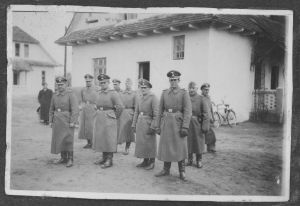Eisner Testimony

Reinhold Feix at Belzec - 3rd from left
I witnessed the climax of his (Feix’s) bestiality one Saturday morning. Otto the Ukrainian officer, rushed us out of our bunk beds early, long before roll call, with a volley of machine gun fire. It was still dark and cold. In front of the gate stood Feix, smiling, dressed in his best officer’s uniform, looking neat and handsome, and apparently in a good mood. It seemed to me that he never slept. I looked around me at the 50 or so young Jews, the slaves that Otto had chosen for the occasion. They all looked the way I felt: depressed, stunned, frightened. Why we were there? What was Feix up to this time? Not a hint. I had instant diarrhoea. I was wet... Feix screamed and slapped me to attention. I regained some strength. I began talking to myself, disciplining myself. He ordered us onto a truck. With a contingent of SS-men and Ukrainians, we were off to a small town in the area for its relatively large Jewish population. In pre-war days, it was a poor and peaceful town. It’s Jewish residents were mostly shoemakers; carpenters, tailors and shop-keepers. Also the town had its righteous; the Rabbi, the shamos – synagogue caretakers, the shocet – ritual slaughterer, and the Yeshiva students. They had dwelt in peace among the Polish Christian neighbours for centuries. Harmony was often lacking, yet they co-existed and Judaism flourished.
But on that Sabbath morning, commandant Feix decided to end those centuries of co-existence once and for all. When the trucks entered the town, they headed straight for the Jewish quarter. The SS announced their presence by firing machine-guns at random into the clusters of small frame houses. No one was yet on the streets. In a few seconds, dozens of men, women and children, began to flee out of back doors and windows, heading for the nearby woods. Feix ordered his men to cut them down. They swiftly obliged. Soon bodies were lying about in small pools of blood. Now the SS blocked-off the narrow dirt streets as the Ukrainians went from door to door to force the inhabitants out of their homes into the square next to the shul – the small village synagogue. Frightened families began to fill the square, mothers and fathers, weeping children and elderly grandparents.
The families of small-town Polish Jews were so tightly knit that only brute force could separate parents from children, brothers from sisters. Family members often preferred to die, rather than be parted from one another. In this Feix’s men once again obliged. At last, perhaps 700 or 800 souls were gathered in the square- weeping, clinging to one another, praying. Still in my truck, I watched the scene with growing dismay. To allay their fears and avoid total panic, Feix ordered a number of able-bodied adult males to go back to their homes for some belongings. “Take just what you need for the trip,” he commanded. “When the trucks arrive, you’re going to another ghetto. We have work for you there.” At gunpoint, he also separated about 50 young men from their families for work at Budzyn. These men were immediately loaded onto our trucks. The remaining Jews, the weeping women and children, the old and the sick, Feix ordered into the shul – their house of prayer. “Pray for a safe journey,” he told them. “You’re all going on a long trip.”
The terrorised Jews slowly crammed into the small wooden structure until it was overflowing. They suspected his motives, but they had no choice. They prayed in fear. They waited for trucks that were never coming. I could detect Feix’s glee as he ordered the doors and windows shut. He had them in their house of God, on their own Sabbath, in the company of their own sacred scrolls. Then, as I watched in horror, I saw Feix toss a can of petrol on the porch. He was roaring with insane laughter, as he picked up his sub-machine gun. He whirled around, as though in a peculiar state of ecstasy. Then he fired the gun at the can. In an instant, the petrol exploded. Wood and flesh fuelled the flames. More petrol cans were hurled. The entire structure, and everyone in it, was ablaze. The screams rose in deafening chorus with the flames. Some people tried to break out through the windows, but machine-guns mounted on the trucks cut them down mercilessly. Sick to my stomach, I watched the inferno from a distance. All my own fears, anguish, and self-pity vanished. I wanted to jump on Feix’s neck. To squeeze it. To wrench the last breath out of his body. But my mind told me I was helpless. All I could do was turn away my eyes to the forest.
Sources
Eisner Statement - Holocaust Historical Society
Photograph – Tomaszow Lubelski Regional Museum Poland
© Holocaust Historical Society 2014

